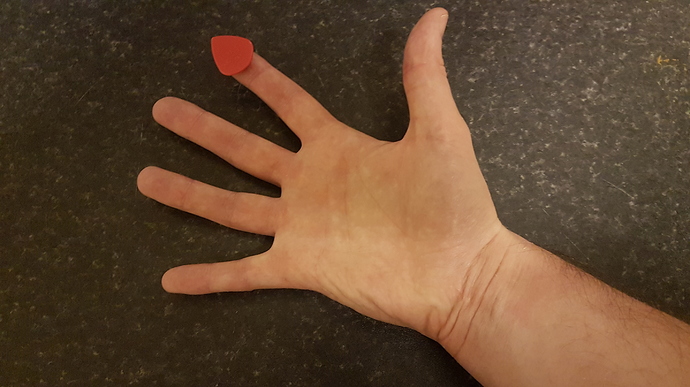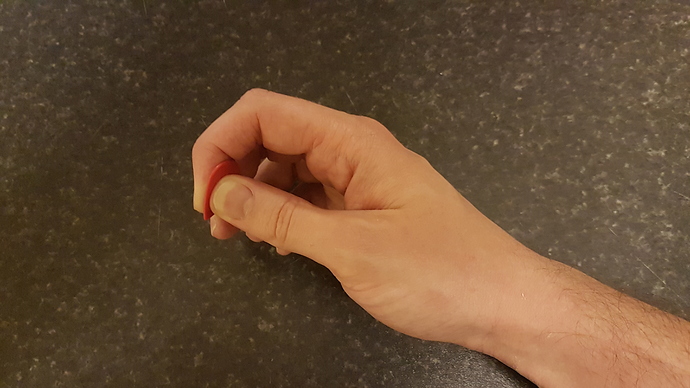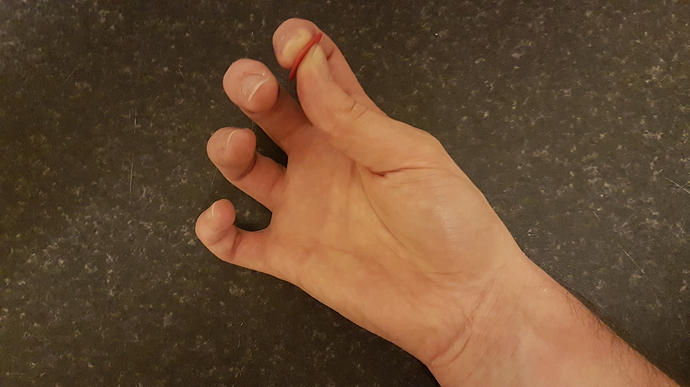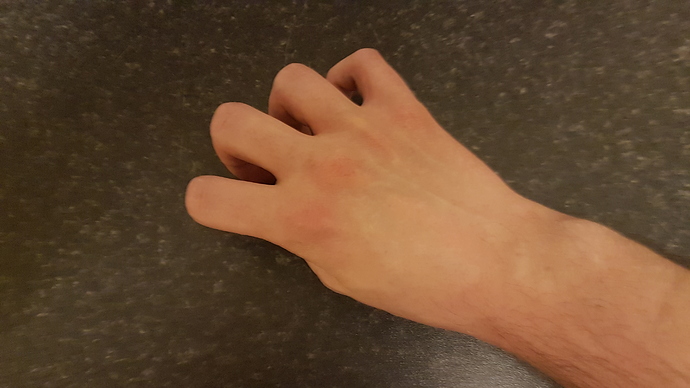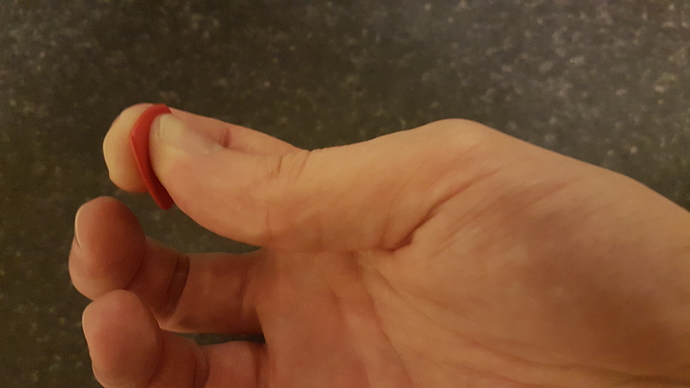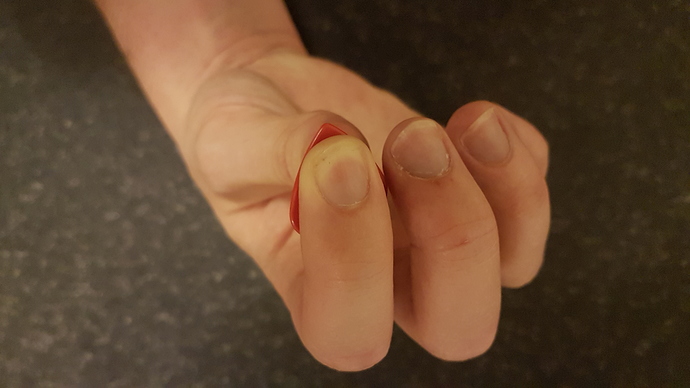Does the technique that Shawn Lane used in his fastest playing with the edge of the pick so extreme that the angle of the pick is negligible? Here he is talking about how he pretty much hols the pick straight up and down as he traverses the strings. He covers this at the 59 second mark.
Shawn used edge picking and pretty much held his pick parallel to the string, so I’m sure the angle is negligible. I bet he just used the tiniest amount of pick too.
Jorge Strunz has the exact same technique:
Shawn’s edge picking angle was extreme, and his pick depth was very shallow. Both of these are a function of his pick grip.
I use a similar pick grip myself a lot of the time, so I’ve included some pictures to try to demonstrate the form. Shawn had a more pronounced hitchhiker’s thumb than I have, so his grip had more of the thumb pad contacting the pick. Due to the large contact area between the pick and the thumb and finger pads, the grip is very secure due to friction. Squeezing with the index finger slightly, the grip becomes rock solid.
The grip might be uncomfortable, or even painful for you to imitate if you don’t have a hitchhiker’s thumb.
I guess I’m a bit confused on this. He uses an extreme angle, so his pick is parallel or perpendicular to the string?
In the video, he talks about focusing the tension, and sorta barely twitching the muscles to cause a tiny vibrating movement. He says it’s like a phonograph needle. I think most really fast/hyper pickers talk about this sorta mechanic.
I believe his pick is basically 90 degrees to the plane of the string.
oh, I see. so his slant is near 90 degrees. Wow, that is pretty extreme. I guess if you have a ‘steeper’ pick-slant… your stroke doesn’t have to be quite as wide to clear the strings.
But on the flip side… it makes 2WPS more difficult. But maybe at that speed… it doesn’t matter… things would be phrased in a way to avoid this.
Hi @hamsterman, it’s his angle of edge picking that’s nearly perpendicular. The angle of pickslant was pretty small.
If you’re talking about pickslanting, no. Shawn’s fretboard lines almost all conformed to the usual dwps formula: upstroke string changes, ascending sweeping, the pull offs to facilitate string changes. A few of them like the pentatonic fives pattern are note for note the same patterns Eric Johnson plays.
There is a small amount or changing strings after downstrokes using perhaps forearm (?) similar to what Yngwie sometimes does. But like Yngwie it’s not frequent. If you understand dwps fretboard layout much of Shawn’s picking choices are pretty clear.
Obviously Shawn’s grip and actual motion mechanics were not really Yngwie- or EJ-like. @Tom_Gilroy as thought more about this than me and thinks there’s an elbow component at the fastest speeds. That may be!
All in all though I would suggest this is one of many, many examples of why we shouldn’t get too hung up on needing to learn all the fancy movements to make great music. A one-way pickslanting strategy and some good ideas is enough to hang with anybody!
Sadly the opportunity to meet him has passed…
ok, so just to clarify… S.L. uses a typical, slightly slanted DWPS motion, but what makes his form unique is his extreme edge angle which is roughly 90 degs? Sorry to pester everyone on this, but I never understood the mystique to his playing.
If this is the case, I’ve seen a few others use 90 degs edge as well, and I understand that it reduces friction… but I played with it for a while as well(I’ve got a hitchhikers thumb)… and it really lacks attack volume. And from what I’ve heard, that reduced friction only comes into play when you get to the John Taylor speed range of 300+ bpm. Or maybe I’m missing something?
Are you asking why does he play with that edge picking amount? Because that’s what he learned to do, same as everyone else who plays whatever way they do. There are lots of ways to do things, none of them are strictly necessary. This just happens to be the particular combination of things he stumbled across, same as all the greats.
Basically. There were several patterns he played which were outliers, involving either 2WPS or crosspicking type movements, though the vast majority of his playing conforms to the typical DWPS paradigm.
I suppose if there is any “mystique”, it’s due to in part to the partial explanations he provided and the lack of high quality video of his playing.
The degree of picking capability he achieved is still astonishing, and he was capable of some truly ferocious picking speeds. It’s not surprising his technique is revered.
16th notes at 300bpm is 20 notes per second. Shawn was able to pick some patterns across strings at that speed, synchronised with the left hand. That’s still extraordinary, 15 years after his death.
Yes, but it was more of a question of the mystique around the technique. Not necessarily why he came up with his form… but more of a, why is his picking considered totally different to other guitarists.
Obviously no 2 guitarists are the same… but his name always comes up when people are discussing unorthodox picking mechanics… .so I figured there’s something else he’s doing.
Yes, that is extraordinary to be able to synch at that speed, and I know I’m probably being sacrilegious here… but I gotta say… is that even possible to demonstrate?
As John Taylor said, at the extreme speeds… nobody could even tell… including the GBOWR. I’ve watched a couple hyper-pickers who claim they can synch… and when you watch it at normally speed… it seems believable… but if you have audio/video where you can really slow things down…it always seems like it’s nowhere near synched. I am not saying it isn’t possible and I’m not saying I know that Sean Lane can’t do this… I’m just saying that it’s so inaudibly fast , that I am wondering if people are just kinda assuming it’s in sync.
btw, I don’t want to discount Sean Lane’s contributions to guitar… he was one of the greats… and I love many of his extraordinary patterns that he played so well… but it’s very hard to imagine true syncing at those absurd speeds.
While there is a genuine lack of high quailty video of Shawn’s playing, there are plenty of high quality audio recordings, and when slowed down, the synchronisation between picking and fretting hands is evident. I’ve slowed the recordings myself using Transcribe! .
When compared to a slowed-down recording of early Chris Impelitteri, the difference is night and day.
Keep in mind, Shawn could only achieve these speeds on a few, very specific patterns which are amenable to being played at those speeds.
You read my mind. I was actually thinking of him when I was typing that. lol.
On a somewhat unrelated note… in the very rare times that I attempt these speeds… I defer to legato. There’s a few short linear patterns that actually do sound somewhat ok at these crazy speeds. I have a two-string sextuplet pull-off pattern (or pull-down) pattern that’s kinda cool sounding.
I’m pretty sure it us. John essentially does this on a simple single string pattern in the clip we put out with him:
You can nit pick that some notes are not being hit squarely if you really want to, but I think that’s missing the point. This is not like the “Hyper Picking” instructional video, where the hands are essentially moving at two different speeds, playing utterly different lines. This is the same tempo and the pickstrokes are where they are supposed to be.
I think the reason there is this perception that hyper picking “can’t be synchronized” is that it’s a type of arm movement that can be stumbled across by inexperienced players who don’t have synchrnonization at any other fast speed. As an example, Brendan on our team actually doesn’t play guitar - I jokingly call him the most technical non-guitarist in the world. But he tools around on the guitars we have and discovered he can actually do this at 280 despite having really no substantial picking technique. We may have to change his “non guitarist” designation eventually!
Show me someone who has actual sustained accuracy at 200-220bpm on stock shreddy patterns, and who can also do the hyper picking movement, and my guess is that person will get much closer to synchronized than someone who has no fast synchronized ability at all. Shawn was certainly in that category so it’s no surprise that his hyper speed playing sounds closer to synchronized as a result.
Do you have an example? He clearly had a high gear, but most of the time when he turned that on it didn’t sound like he was going for note-on accurate so much as a letting loose vibe thing. And again, the reason I think he got closer to “synchronized” even during these looser type passages is that he could actually do note-on synchronization at other levels of fast, so he had reference point for what that feels like when he wanted it.
Hi @Troy.
There’s a 3 note per string pattern that alternates between a group of 6 and a group of 9 that Shawn played, and is alternate picked with the exception of one swept string change. Taking this pattern as a 15 note sequence, and measuring the time until the sequence repeats, the rate ends up being (approximately) 20 notes per second. It sounds like a nonsensical blur at full speed, but when slowed down the synchronisation is evident.
It’s mechanically similar to a diminished string skipping pattern showed on Power Licks, but without the string skips. Even with the string skips, Shawn could play that sequence at 17-18 notes per second.
I’m not sure if the specific sequence is actually on Power Licks/Solos. I think the clip I checked in Transcribe! came from recording of a clinic.
Most other patterns he could play at similar speed involved hammer-ons. I think left hand hammers was the key to his synchronisation. I’ve definitely found that all hammers has helped me to chunk fretting patterns with the left hand and helped me maintain a more even rate. From there, you just need an even picking movement you can perform at the same rate.
The only caveat is that moving your fretting hand that fast basically results in every fretting movement having enough momentum to sound the note, so it’s difficult to really tell if the pick is sounding every note, or if the pick whiffs on certain notes that are sounded only with the left hand as a result.
Most of what he played at similar speeds is him letting loose, as you said. The conjectured elbow mechanic seems to kick in for a burst, which doesn’t have the same degree of synchronisation when slowed down. It’s largely a moot point at that speed anyway, it just sound like fast noise. Cool sounding noise, but still noise.
It’s sounds like it’s a variation on the fours and fives thing he does. It’s the one on the tape where he comments that he can only start the pattern on an upstroke or it “falls apart”, or something to that effect. If you tack on a descending six to that - starting on an upstroke of course - you get 15 notes and the picking all works out dwps style.
Edit - here’s the phrase:
Hi @Troy, that lick with an adjoined six is one of the few things Shawn could pick at those types of speeds for a sustained run, but that’s actually not the pattern I was thinking about. The lick I was thinking of is mechanically similar, but it ascends.
Actually, that’s not the same variation of six and nine that’s demonstrated with the diminished string skips, which isn’t all picked. That’s at about 42:20. I haven’t watched Power Licks in awhile, sorry for the confusion.
Also, in the all-picked diminished string skipped sixes just preceding that, that’s actually one of the few examples where he uses 2WPS. Not quite his top gear, but pretty damn fast.
Maybe the occasional ascending economical stroke helped to give him a landmark for chunking purposes. I haven’t heard him play straight sixes quite that fast, usually that’s about 18 notes per second maximum.
Incidentally, on two separate evenings in the last 6 months my body managed to figure out how to move my picking hand that fast, with Shawn’s grip. Synchronisation with the fretting hand wasn’t there the first time, but it felt passable the second time around. Both times, I was just going hell for leather without worrying about cleanliness or keeping perfect time.
On the next days, it just wasn’t there anymore. Honestly, I’m not frustrated by the lack of repeatability, I’m just impressed by the possibility. Maybe lightning will strike again, and maybe I’ll be able to catch it next time.

